The Psychology Behind Card Counting: Outsmarting The Casino
The Psychology Behind Card Counting: Outsmarting The Casino
Card counting in blackjack is not just about luck; it is a strategic approach that allows players to gain an edge over the casino. By understanding the psychology behind card counting, players can make informed decisions and increase their chances of winning.
The key to card counting lies in keeping track of the ratio of favourable cards to unfavourable cards and adjusting bets accordingly. This technique can be a powerful tool in the hands of skilled players, but it also requires emotional control and effective bankroll management.
While card counting can give players a small advantage, it is important to note that it is not a guaranteed way to outsmart the casino.
Key Takeaways:
- Card counting is a strategic approach in blackjack that allows players to increase their chances of winning.
- Players keep track of the ratio of favourable cards to unfavourable cards to make informed decisions.
- Emotional control and effective bankroll management are crucial for success in card counting.
- Card counting is not a guaranteed way to outsmart the casino, as casinos employ countermeasures to detect and prevent it.
- Responsible gambling and ethical considerations should always be kept in mind when engaging in card counting.

Understanding Card Counting Techniques
Successful card counting relies on understanding and implementing various techniques to keep track of the cards in play. By monitoring the ratio of favourable cards to unfavourable cards, players can make informed decisions and adjust their bets accordingly. Let's explore some of the most commonly used card counting techniques:
- Hi-Lo Count: The Hi-Lo Count is one of the simplest and most popular card counting systems. It assigns a value of +1 to low cards (2-6), a value of 0 to neutral cards (7-9), and a value of -1 to high cards (10-Ace). Players keep a running count by adding and subtracting these values as cards are dealt, giving them an indication of the remaining favourable cards.
- Omega II Count: The Omega II Count is a more complex card counting system, assigning different values to cards ranging from +2 to -2. It takes into account the different strengths of cards and allows players to make more accurate predictions based on the running count.
- Knock-Out Count: The Knock-Out Count, also known as the KO Count, is an unbalanced card counting system. Unlike balanced systems like the Hi-Lo Count, the Knock-Out Count does not require players to convert the running count into a true count. This makes it easier to use and is a popular choice for beginners.
Implementing these card counting techniques requires practice and concentration. Players must keep track of the running count while also making decisions during the game. It is important to remember that card counting is not foolproof and does not guarantee consistent winnings. Additionally, casinos employ countermeasures to detect and prevent card counting, making it essential for players to maintain a low profile and avoid detection.
Note: The table below summarises the different card counting techniques discussed:
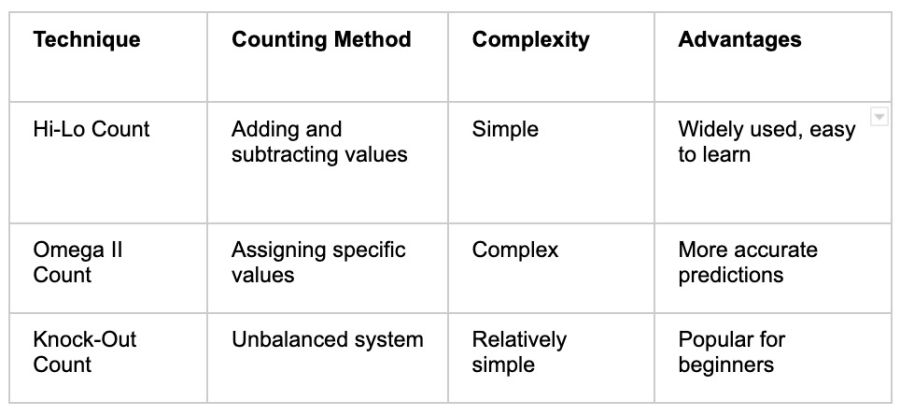
The Role of Emotional Control in Card Counting
Emotional control is crucial in card counting as it helps players make rational decisions based on the cards and not be swayed by emotions. When counting cards in blackjack, it is easy to become excited or anxious when faced with favourable or unfavourable situations. However, letting emotions dictate one's gameplay can lead to poor decisions and ultimately, losses.
By maintaining emotional control, players can stay focused on the mathematical probabilities and strategic implications of their card counting efforts. This allows them to make informed choices, such as whether to hit, stand, or double down, based solely on the perceived advantage in the deck. Emotions, on the other hand, can cloud judgement and lead to impulsive or irrational decision-making.
Furthermore, emotional control is closely linked to effective bankroll management in card counting. A disciplined approach to managing one's funds ensures that losses are minimised and that the player can continue playing even during negative swings. This requires the ability to detach oneself from short-term outcomes and maintain a long-term perspective on the profitability of the card counting strategy.
Team Play in Card Counting: Advantages and Strategies
Team play can provide significant advantages in card counting, but it also requires ethical considerations and cooperation among players. When working together, a team of card counters can effectively increase their chances of winning and minimise the risks associated with individual play. By pooling their knowledge and skills, players can overcome the challenges posed by casino countermeasures and implement more elaborate card counting strategies.
One of the main advantages of team play is the ability to perform more accurate card counting. With multiple players keeping track of different sections of the shoe, the team can gather more precise information about the remaining favourable cards and adjust their betting accordingly. This allows them to make more informed decisions and maximise their profits while minimising the risk of detection.
In addition to improved card counting accuracy, team play also provides a greater level of security. By working together, team members can act as lookouts for suspicious casino personnel and alert the rest of the team if any countermeasures are being employed. This enables the team to adjust their strategy accordingly and avoid detection, ensuring a longer and more successful playing session.
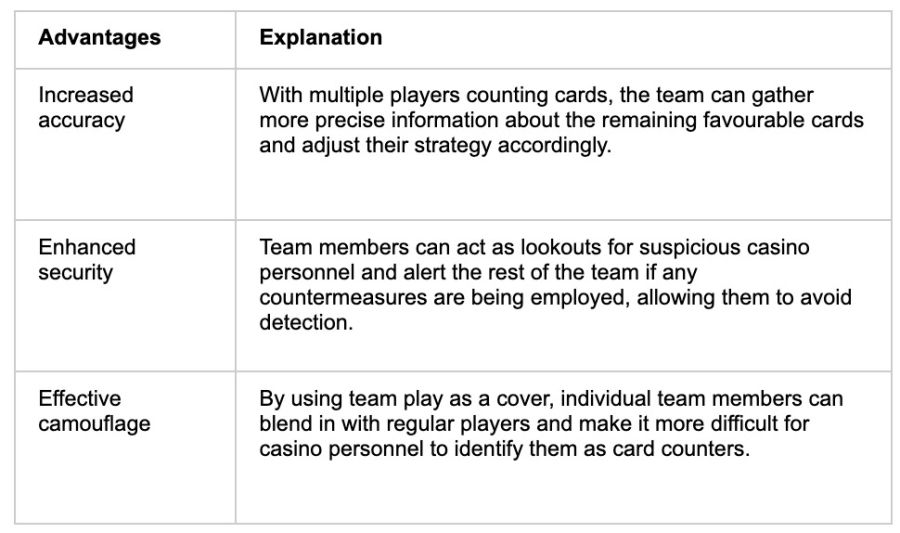
However, it is important to note that team play in card counting raises ethical considerations. While card counting itself is not illegal, using a team to gain an advantage over the casino can be seen as a form of collusion. It is essential for team members to establish clear guidelines and adhere to a code of conduct to ensure fair and ethical gameplay. This includes maintaining a respectful and cooperative attitude towards other players and casino staff.
Card Counting Software vs. Manual Counting: Pros and Cons
Card counting software has its advantages and disadvantages compared to manual counting techniques in blackjack. Let's take a closer look at both approaches.
One of the main advantages of using card counting software is its accuracy and efficiency. These software programs are designed to track the ratio of favourable to unfavourable cards with precision, providing players with real-time information and calculations. With software, players can quickly analyse complex data and make informed decisions in a matter of seconds.
Additionally, card counting software eliminates the risk of human error. Even the most skilled manual counters can make mistakes or lose track of the count, especially in high-pressure casino environments. Software, on the other hand, ensures accuracy and consistency, giving players a reliable tool for maximising their chances of winning.
However, it's important to consider some drawbacks of relying solely on card counting software. Firstly, not all casinos allow the use of electronic devices at the blackjack table. Therefore, using software may not be an option in certain establishments, limiting its potential usefulness.
Furthermore, card counting software can be quite expensive. The cost of purchasing or subscribing to these programs may outweigh the potential benefits, especially for occasional players or those with limited budgets. Manual counting, on the other hand, is accessible to anyone without any additional costs.

Famous Card Counters Throughout History
Throughout history, there have been notable individuals who have mastered the art of card counting and achieved great success in casinos. These professional card counters have captivated audiences with their skill, intelligence, and ability to outsmart the casino. Let's take a closer look at some of the most famous card counters in history.
1. Edward Thorp

"My system works. If you count the cards, bet more when you have the edge, and less when you don't, you can come out ahead in the long run."
Edward Thorp, an American mathematician, was one of the pioneers of card counting. He developed a groundbreaking system for blackjack known as the "Ten-Count" strategy and docume\nted his findings in the book "Beat the Dealer." Thorp's work laid the foundation for modern card counting techniques and brought the practice into the mainstream.
2. Tommy Hyland

"Team play is about trust, discipline, and working together towards a common goal."
Tommy Hyland, an American professional blackjack player, is renowned for his expertise in card counting and team play. He founded and managed the longest-running blackjack team in history, which successfully operated for over 25 years. Hyland's strategic approach and leadership skills made him a prominent figure in the world of professional card counting.
3. Ken Uston

"Card counting is simply using your brain to overcome the casino's built-in advantage."
Ken Uston, an American professional blackjack player, gained notoriety for his advocacy of card counting and his legal battles against casinos. He authored the book "The Big Player," which detailed his experiences as a high-stakes card counter. Uston's influential efforts played a crucial role in challenging the legality of card counting and shaping public perception of the practice.
These famous card counters represent a small fraction of the skilled individuals who have left their mark on the world of gambling. Their stories serve as a reminder of the potential rewards and risks associated with card counting, highlighting the importance of skill, discipline, and ethical considerations in pursuit of success in the casino.
Countermeasures Against Card Counting: How Casinos Protect Themselves
Casinos have implemented various measures to detect and deter card counters, aiming to protect their profits and maintain the integrity of the game. These countermeasures are designed to identify players who are using card counting techniques and to disrupt their strategies.
One common countermeasure is the use of multiple decks in blackjack games. By increasing the number of decks in play, the effectiveness of card counting is diminished, as it becomes harder for players to keep track of the cards. Additionally, many casinos employ constant reshuffling machines, which eliminate any advantage that card counting may offer.
Another tactic used by casinos is training their dealers to spot suspicious behaviour. Dealers are trained to look out for players who exhibit certain patterns or behaviours associated with card counting. They are taught to pay attention to players who consistently make large bets after a string of low-value cards have been dealt or those who exhibit unusual betting patterns.
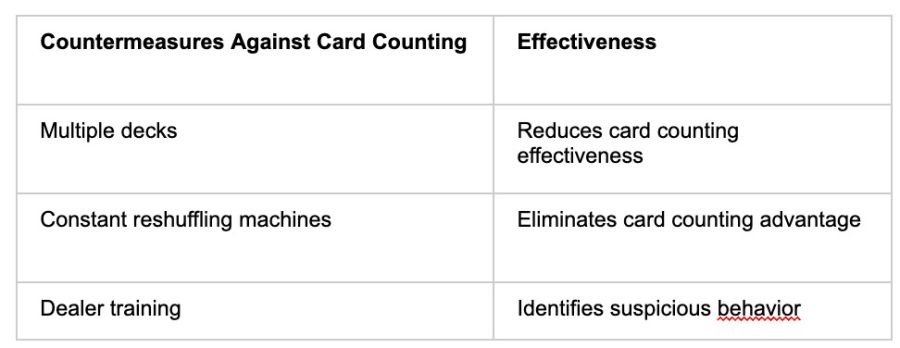
In the words of a casino owner, "We are constantly evolving and improving our security measures to stay one step ahead of card counters. Our goal is to ensure that every player has a fair and enjoyable gaming experience."
To further deter card counters, some casinos use advanced surveillance systems that monitor playing behaviour and analyse patterns. These systems can detect unusual betting patterns or deviations from the expected odds of the game. If a player is deemed to be counting cards, they may be asked to leave the casino or banned from returning.
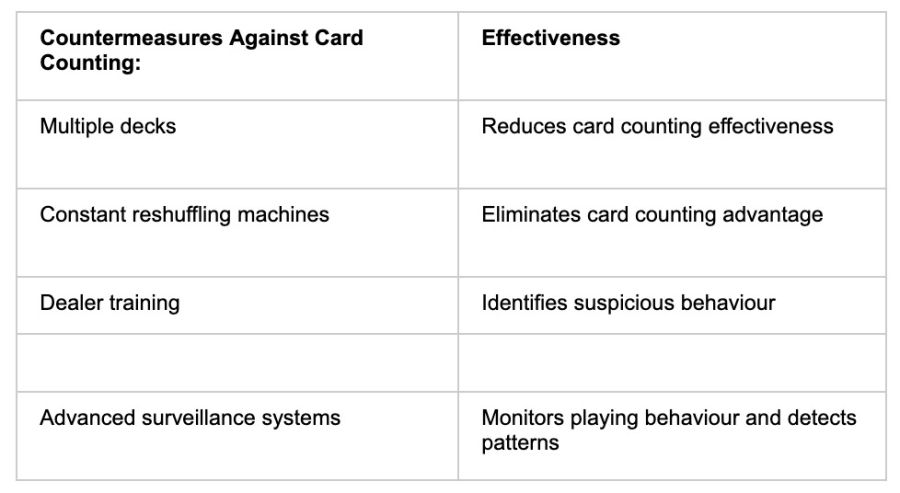
The Impact of Blackjack Strategies on Card Counting
Utilising effective blackjack strategies can enhance the effectiveness of card counting and improve a player's odds of winning. When combined with a well-executed card counting technique, strategic gameplay can optimise the player's chances at the blackjack table.
One popular strategy is the basic strategy, which provides players with a mathematically calculated plan of action for every possible hand. By following this strategy, players can make the most statistically advantageous decisions based on their own hand and the dealer's up-card.
Another strategy is the composition-dependent strategy, which takes into account the specific composition of the player's hand and the cards already dealt. This strategy allows players to adjust their decisions based on the remaining cards in the shoe, increasing their accuracy in predicting the likelihood of favourable outcomes.
Table: Comparison of Blackjack Strategies and Their Impact on Card Counting

When incorporating blackjack strategies into card counting, players can improve their decision-making process, increase their odds of winning, and minimise losses. It is important to note, however, that even with the best strategies, there is still an inherent element of chance involved in the game of blackjack.
By combining card counting techniques with effective blackjack strategies, players can stack the odds in their favour and increase their chances of walking away from the table as winners.
Uncovering the Truth: Card Counting Legality and Ethical Considerations
The legality of card counting varies across jurisdictions, and players should also consider the ethical implications of their actions. In some countries, card counting is considered legal because it involves using one's skills and knowledge to gain an advantage over the casino. However, in other jurisdictions, casinos have successfully lobbied for laws that make card counting illegal and punishable by fines or even imprisonment.
It is important to note that even in jurisdictions where card counting is legal, casinos are well within their rights to ban players who they suspect of counting cards. These bans are typically enforced through facial recognition technology and shared databases among casinos. While being banned from a casino may not have legal consequences, it can severely limit a player's options for future gambling.
Additionally, players must consider the ethical implications of card counting. While some argue that it is a fair strategy as long as it is not explicitly prohibited, others believe that it goes against the spirit of the game. Casinos are businesses that rely on the odds being in their favour, and card counting disrupts this balance. It can be seen as taking advantage of a flaw in the system, and some players may feel uncomfortable with that.
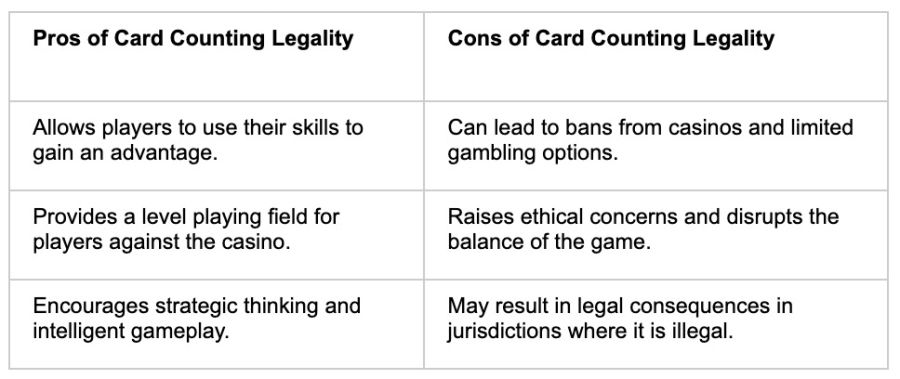
The Popularity of Card Counting: Books, Movies, and Media
Card counting has captured the interest of both avid gamblers and the general public, as demonstrated by its popular portrayal in books, movies, and other forms of media.
Numerous authors and filmmakers have been fascinated by the allure of card counting, exploring its psychological aspects and the thrill of outsmarting the casino. These portrayals have helped to popularise the concept of card counting and bring it into the mainstream consciousness.
One of the most famous books on card counting is "Bringing Down the House" by Ben Mezrich. This non-fiction account follows a group of MIT students who used their mathematical prowess to successfully beat the casinos. The book inspired the hit movie "21," which further cemented card counting's place in popular culture. The film stars Kevin Spacey and tells the gripping story of a group of college students who use card counting to win big in Las Vegas.
Another notable book is "Beat the Dealer" by Edward O. Thorp, which was published in 1962. This book revolutionised the world of gambling by introducing the concept of card counting to the masses. Thorp's work laid the foundation for future card counting strategies and inspired countless players to try their luck at the blackjack tables.
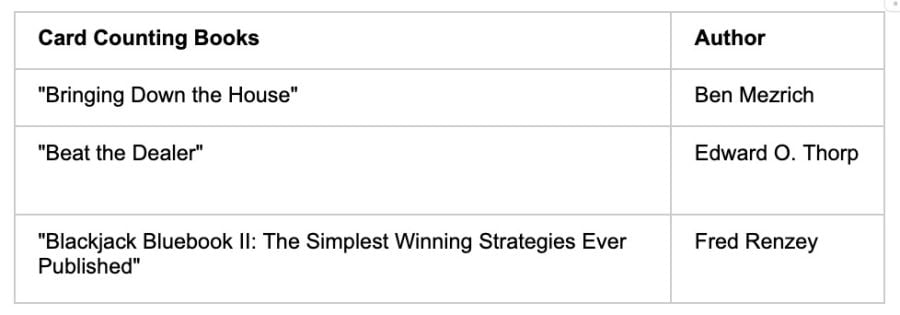
In addition to books, card counting has made its mark on the silver screen. Movies like "Rain Man" and "The Hangover" include memorable scenes featuring card counting, adding an element of excitement and sophistication to their storylines. These cinematic portrayals have contributed to the mystique surrounding card counting and have fueled the imagination of moviegoers.
"The Hangover: Some guys just can't handle Vegas." - Alan, "The Hangover"
Card counting has also been a popular topic in documentaries and television shows. Programs like "Breaking Vegas" and "MIT Blackjack Team" have delved into the world of professional card counters, showcasing their strategies and the challenges they face. These documentaries offer viewers a glimpse into the high-stakes world of card counting and provide a deeper understanding of the psychology behind this intriguing practice.
The Fascination Continues
The popularity of card counting in books, movies, and media shows no signs of waning. As long as blackjack remains a popular casino game, the intrigue and fascination surrounding card counting will persist. Whether it's through gripping narratives in books, thrilling scenes in movies, or thought-provoking documentaries, card counting will continue to capture the imagination of audiences around the world.
Conclusion
Card counting in blackjack can provide players with some advantages, but it is important to remember that it does not guarantee continuous success in outsmarting the casino. The psychology behind card counting is based on the fact that players can increase their bets in favourable situations and make decisions based on information gathered during gameplay.
By keeping track of the ratio of favourable cards (aces and 10-valued cards) to unfavourable cards (low-valued cards), players can predict the likelihood of winning the next hand and adjust their bets accordingly.
However, casinos are well aware of card counting strategies and have implemented measures to make it more difficult for players to succeed. They use multiple decks, constant reshuffling, and train their dealers to spot card counters. The success of card counting also depends on the player's ability to camouflage their counting methods and maintain a sufficient bankroll.
It is crucial to approach card counting with caution and responsibility, adhering to ethical considerations. While card counting can provide a slight edge, it is not a guaranteed way to outsmart the casino. It is important to remember that gambling should always be done responsibly and within one's means, with an understanding that casinos are ultimately designed to have the mathematical advantage.
Card counting has captured the imagination of many, leading to its portrayal in popular culture through books, movies, and media. These depictions highlight the intrigue and fascination surrounding the practice, but it is essential to separate fiction from reality. Card counting is a skill that requires practice, patience, and a deep understanding of the game. It is not a quick and easy route to riches, but rather a nuanced strategy that can give players a small advantage in the right circumstances.








